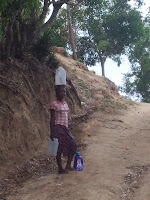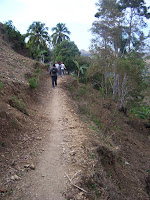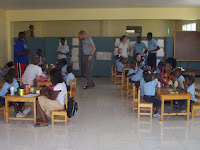
The following are my journal entries while I was in Haiti...feel free to scroll through to look through the pictures or read the passages. Thank you to everyone who helped support me on this trip. Let me know if there is anything from the trip you'd like to talk about...I know its a lot so I'm not offended if you just want to look at the pictures. :)
I have recently completed my first year of seminary and it was both challenging and rewarding not only academically but spiritually as well. As many students probe deeper into the study of theology, questions bubble up along the way. The question that kept coming up for me was what does it mean to be a Christian in a world that contains suffering? The exploration of this topic led me all the way to the poorest slum in the poorest country in the western hemisphere: the Cite Solei area of Port-au-Prince, Haiti.
While in Haiti I mainly visited the St. Joseph’s Family in Haiti, which includes the St. Joseph's Home for Boys in Port-au-Prince, Wings of Hope in Fermathe, and Trinity House in Jacmel. In 1985, Michael Geilenfeld, a former Brother with Mother Theresa’s Brothers of Charity, started a small home for five boys to bring them off the streets and offer them a Christian family life. Today there are now three homes serving more than 60 children. Graduates from the first home, St. Joseph’s Home for Boys, run a home for disabled children called Wings of Hope outside Port-au-Prince and a home for young boys called Trinity House in the small coastal town of Jacmel.
I had what some might consider an odd reaction after traveling back from Haiti. I was euphoric . I came back feeling joyful and hope-filled. I had been amidst such deep suffering and yet I had witnessed such a deep faith among the people of Haiti. Worshipping with them while I was there, I had never felt so welcome. They embraced a ministry of hospitality that was fully welcoming of me simply because I was a member of the Body of Christ. I came to Haiti to minister to others but I was the one ministered to. I have never had my faith tested in the way that the people of Haiti have. If anything my life feels idealic in comparison with the stories of street children and child slaves that I heard. Yet to worship alongside of them strengthened my own faith. I could not help but feel that if they could shout praises to the Lord in the midst of suffering than how could I could do anything less than that. Ellen Davis notes that the sufferer who keeps looking for God has, in the end, privledged knowledge. The one who complains to God, pleads with God, rails at God, and does not let God off the hook – she is at last admitted to a mystery. She passes through a door that only pain will open and is qualified to speak of God in a way that other, whom we generally call more fortunate, cannot speak. The sufferer than becomes a teacher , a theological resource for the rest of the community because they so fully know what it means to live out what Jesus refers to as the greatest commandment – to love God with our whole heart.
The other half of that commandment is to love our neighbor because when we love our neighbor we are more fully loving God by doing the will of God. So that means for us as believers that we must care about the Haiti’s of this world. While in Haiti I met many children who were orphans or abandoned by parents who simply had no means for caring for them. These children became street children living and sleeping in the streets or restaveks, child slaves. As I encountered these children I could not help but think of the passage in Matthew in which Jesus addresses “the least of these.” Matthew 18:1-5. This passage is contained in Jesus’ fourth of five teaching discourses located within the Gospel of Matthew. In the fourth discourse, Jesus outlines for the disciples what it means to live in Christian community with ideas concerning discipline and forgiveness. The passage begins with a disciple asking who the greatest in the kingdom of heaven is. In this culture, we typically think of “greatness” consisting of wealth, power, and status and this would have been important for the imperial elite. However, Jesus surprises us in the next line by offering an alternative vision which gives preference to children. This is not a reference to innocence or purity but instead a counter-cultural message. Jesus is referring to those who are excluded from mainstream society, the powerless, without economic resources, vulnerable, threatened, and submissive. While this passage is a reference to all members of marginalized society it is also beautifully illustrated in the children of Haiti: the suffering members of society who go unnoticed. It teaches us that Jesus was less concerned with social status and more concerned with humility. Jesus was concerned with the marginalized members of society and therefore so should we.
 Church with the boys and the other guests in the home this morning. The service included liturgical dances by the boys, readings, prayers, and hymns in both Kreyol and English. The service was so welcoming of all of its english speakers - another of the various signs of hospitality offered at the house. At the conclusion of the service we all took Communion together - yet another very present sign that regardless of our backgrounds we are all united in the Body of Christ. After the service we gathered to eat lunch on the balcony and one of the guys is playing guitar and sang us a song he had written himself. He has a beautiful voice.
Church with the boys and the other guests in the home this morning. The service included liturgical dances by the boys, readings, prayers, and hymns in both Kreyol and English. The service was so welcoming of all of its english speakers - another of the various signs of hospitality offered at the house. At the conclusion of the service we all took Communion together - yet another very present sign that regardless of our backgrounds we are all united in the Body of Christ. After the service we gathered to eat lunch on the balcony and one of the guys is playing guitar and sang us a song he had written himself. He has a beautiful voice.
 artners but as my prayer partner was out, I helped the younger
artners but as my prayer partner was out, I helped the younger 













































